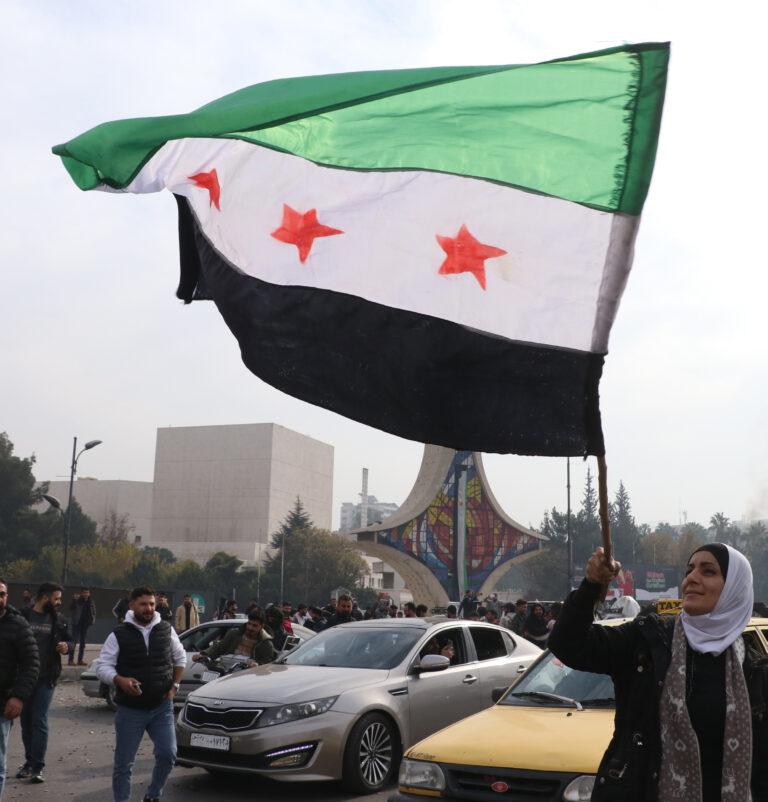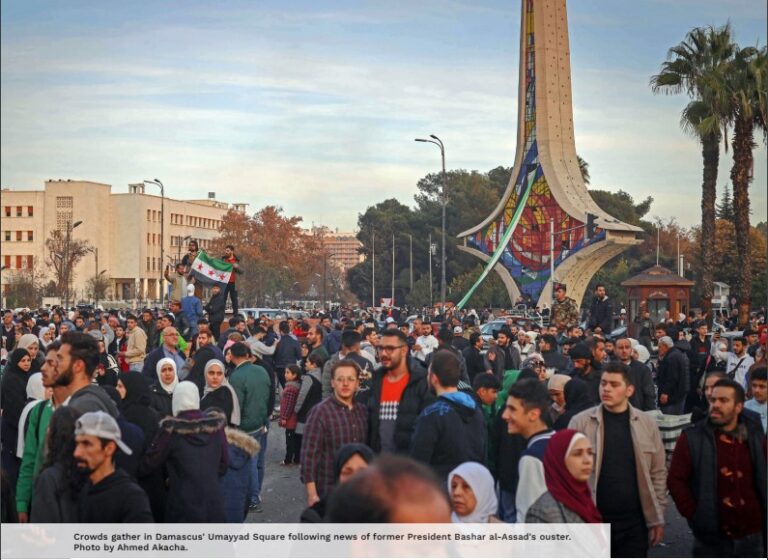Syria Update
14 February to 20 February, 2019
The Syria Update is divided into two sections. The first section provides an in-depth analysis of key issues and dynamics related to wartime and post-conflict Syria. The second section provides a comprehensive whole of Syria review, detailing events and incidents, and analysis of their respective significance.
The following is a brief synopsis of the in-depth analysis section this week:
On February 17 Syrian President Bashar Al-Assad delivered an hour long speech in Damascus to the recently elected heads of city and municipal councils in Government of Syria-controlled territory; this was the first major speech President Al-Assad has made since August 2017. Much analysis has centered on President Al-Assad’s statements about the U.S. role in northeastern Syria; however, the speech actually covered a number of topics to include the new role of local governance in Syria, refugee returns, the ongoing economic crisis in Syria, the formation of the Syrian constitutional committee, and the hostile role of ‘foreign actors’ in Syria, to include the U.S. and Turkey. In some ways the speech reiterates long standing Government of Syria political positions, namely the sovereignty of the Government of Syria and the role of foreign countries as instigators of the conflict. However, it is important to note that in Syria, an official speech made by the President is de-facto Government of Syria official policy; indeed, the Syrian Prime Minister’s office has already held preliminary meetings on how to implement the agenda laid out by President Al-Assad. Therefore, understanding of the specific themes and terms used in President Al-Assad’s speech will be a critical component to understand the Government of Syria’s priorities in the coming year.
The following is a brief synopsis of the Whole of Syria Review:
- The presidents of Turkey, Russian and Iran met in Sochi. The Government of Russia appears to openly endorse the prospect of a Turkish military intervention in the event of a breakdown of negotiations between the SDF and the Government of Syria; it is also likely that Turkey will take direct action in northwestern Syria to resolve the status of the northwestern Syria disarmament zone.
- The SDF military council met to discuss their post-ISIS strategy; however, the SDF’s current set of demands remain unfeasible considering their weak negotiating position.
- ISIS forces continued to negotiate their surrender, while the fate of the captured international ISIS combatants remains a source of concern for many western nations.
- Humanitarian corridors were established at the Rukban camp, allowing individuals to leave Rukban and reconcile their status with the Government of Syria; despite reported concerns from many IDPs, it is likely that many individuals will utilize the corridors in the coming weeks due to the dire conditions in the camp itself.
- Opposition-held northwestern Syria witnessed the heaviest shelling since the start of the Northwestern Syria Disarmament Zone agreement, highlighting the extreme fragility of the agreement and the increasingly possibility of a major offensive in the absence of direct Turkish intervention.
- Assassinations and asymmetric attacks, as well as continued detention campaigns, continued to take place in Dar’a governorate, in a further indication of the rapidly deteriorating security conditions in southern Syria.
- The Government of Syria Customs Forces cracked down on businessmen in Homs and Hama for trading in cross-line goods; the crackdown is not likely designed to prevent cross-line, but instead an effort to centralize cross-line trade under the Government of Syria.
- The new Lebanese Minister of Displaced Peoples Affairs visited Damascus; Lebanon’s new government, despite its divisions, is somewhat unified in its stance in favor of increased Syrian refugee returns.
- Many Government of Syria civil servants were dismissed for working or coordinating with the Kurdish Self Administration. Government of Syria and Kurdish Self Administration administrative structures often coordinate and exist in parallel; thus, dismissing staff for this reason is an indication that the Government of Syria intends to apply further governance pressure to the Kurdish Self Administration.
President Al-Assad’s Speech
In Depth Analysis
On February 17, Syrian President Bashar Al-Assad delivered a televised speech in Damascus to the heads of every local council, city council, and municipality in Government of Syria-held territory. President Al-Assad spoke for nearly one hour, with frequent ‘spontaneous’ interruptions from participants in attendance to voice their approval, recite poetry, or applaud the President’s points. This was the first major speech President Al-Assad has made since August 2017. Much of the media coverage and analysis of the speech has incorrectly centered on President Al-Assad’s statements about the role of the U.S. in northeastern Syria, such as his statement: “we say to those groups who are betting on the Americans, the Americans will not protect you…the Americans will put you in their pockets so you can be tools in the barter.” However, President Al-Assad’s speech was much more broad reaching, spoke to numerous pressing issues across Syria, and should be viewed as an expression of the Government of Syria’s priorities and political stances with respect to the entire of the Syrian conflict and the future post-conflict Syria. In the speech, President Al-Assad touched upon five essential points: the new role of local governance in Syria; refugee returns to Syria; the worsening economic situation, especially the ongoing gas crisis, in Syria; the formation of the constitutional committee; and the role of ‘foreign actors’ in Syria, namely the U.S. and Turkey.
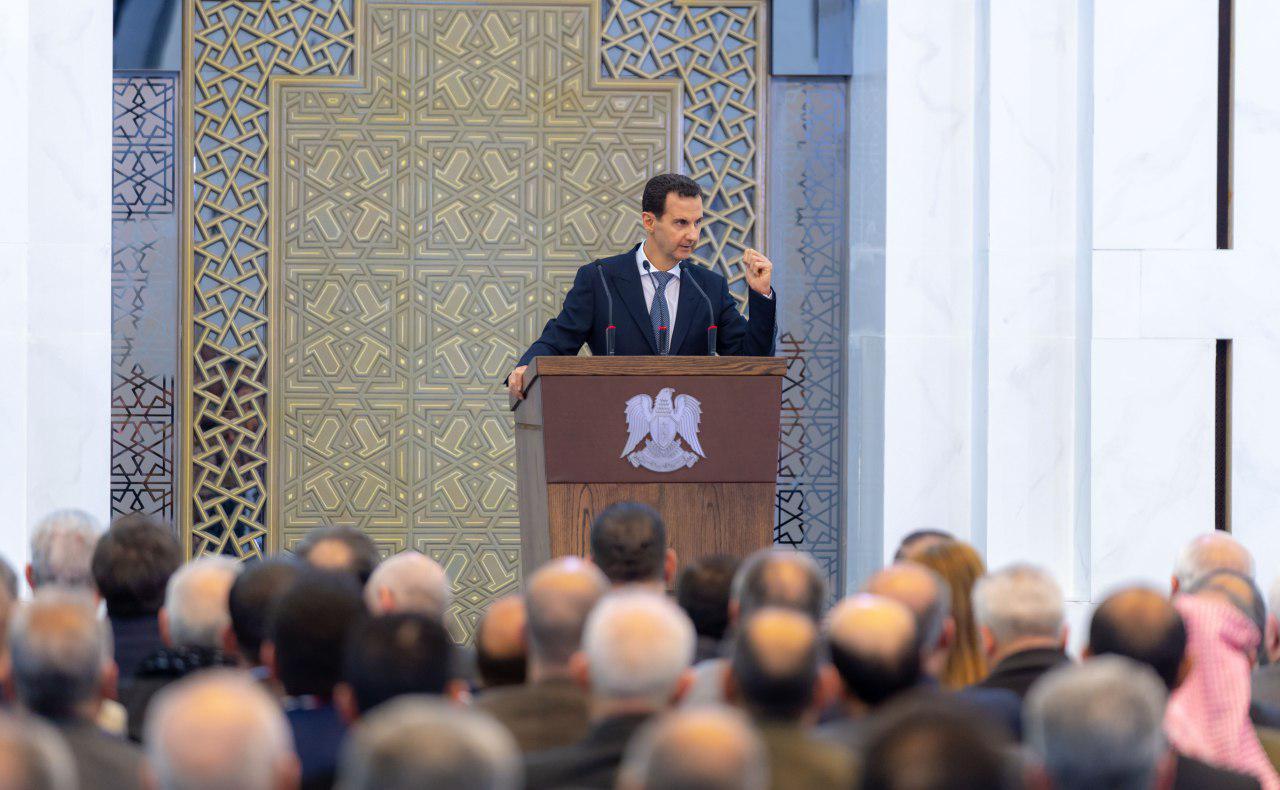
Local Governance
As President Al-Assad was addressing the heads of Syria’s city councils and municipalities (all of whom were recently elected in national elections in September 2018), local governance was a major if not the central focus of the speech. President Al-Assad regularly cited the successes of building local governance in Government of Syria-held areas, particularly through the implementation of Decree 107, which according to President Al-Assad “should have been implemented within five years, but it was issued at the time when the war began on Syria.” President Al-Assad further stated that local governance will become “vital for the central authority [of the state] in terms of devising more realistic plans that suit the needs of citizens and the country,” and noted that decentralization must be done in coordination with “central establishments [that] can focus on an overseeing role and on comprehensive strategies and policies.” Decree 107 was passed as part of the reforms package of 2011, and delegated more authority to locally elected city councils and municipalities; it is also notoriously complex and subject to interpretation. Of note, Decree 107 had actually been used as a framework to justify many former armed opposition and Kurdish local governance bodies in Syria, and many of these same actors have at one point cited the decentralization component of the decree as a potential means of preserving existing bodies in a post-conflict Syria. This use of Decree 107 by the opposition and the Kurdish Self Administration was also addressed by President Al-Assad, stating that “countries that support terrorism…[are] applying a type of decentralization that is different from the one Decree 107 proposes; a decentralization that weakens the state’s authority and marginalizes it, thereby weakening sovereignty, nationalism, and social cohesion, which would lead to social division and ultimately geographic division.” In this way, President Al-Assad is committing the Government of Syria to this new local administrative structure, and is in a sense imbuing them with actual authority, yet while also reiterating that this authority is subject to the more centralized Government of Syria state structures.
Refugee Return
The issue of refugee return was also a major focus of President Al-Assad’s speech. President Al-Assad stated that the issue of Syrian refugees is one which has been exploited by “states that support terrorism” (in likely reference to western countries and Turkey); he added that resolving the refugee issue would mean that “those sides would lose their political excuses and the financial benefits…this is why European and American officials make audacious statements openly opposing the return of refugees under silly and unconvincing excuses…there are constant attempts to convince refugees and expatriates that they are wanted and would be arrested if they enter Syria.” President Al-Assad concluded by calling “on all those who left the country because of terrorism to return and carry out their national duties and contribute to building the homeland.” Here it is worth noting that return to Syria, for those refugees who wish to even do so, is by no means an easy process. For example, a Syrian refugee who fears detention upon return must first go to the Syrian embassy and apply for reconciliation. This reconciliation application is then submitted to the National Security Office in Damascus for approval; not all applications are approved, though the reasons for rejection are rarely given. Even upon return, there is also no guarantee that reconciliation would guarantee protection from arrest or detention. Furthermore, while personal reconciliation extends to the Government of Syria civil state, it does not necessarily include the various security branches that reportedly keep their own security lists, as well as the myriad local pro-Government militias. Finally, reconciliation does little to mitigate fears of conscription, which is reportedly a major concern for many men.
Economic Conditions and ‘The Four Wars’
President Al-Assad also addressed the ongoing economic crisis in Syria, especially the gas crisis, noting that there are three “self-evident” points that must be addressed when discussing Syria’s economic challenges: first, that “the complaints that were heard expressed actual suffering that wasn’t fabricated or exaggerated”; second, that “criticism is necessary when there are shortcomings, but should be objective”; and third, that “dialogue…should be productive and based on facts, not emotions.” President Al-Assad equated the economic challenges in Syria to the fact that the war is not over, and that, “we are now waging four wars: the first war is a military one, the second is the ‘siege’ (referring to international sanctions), the third is via the internet and social media, and the fourth is the war launched by corrupt people.” President Al-Assad thus acknowledged the economic challenges facing Syria; however, he placed the onus of the economic crisis on economic sanctions, and the efforts of outside actors who “seek to create chaos from inside the Syrian society.” He devoted considerable time to condemning social media coverage of the economy (and in Syria generally), which he claimed was often “based on spreading misinformation via pages or sites that assume national identities or claim to represent a local village or city or neighborhood.” He also acknowledged that corruption, and combating corruption, would increasingly become the responsibility of local governance bodies, as “such details cannot be managed with a centralized approach.” In effect, President Al-Assad is telling the Syrian people that economic conditions are likely to remain poor, and shortages will continue, while simultaneously blaming them on western governments and condemning social media coverage of these economic challenges, which “spread stories about the economy that affect citizens’ trust in their country.”
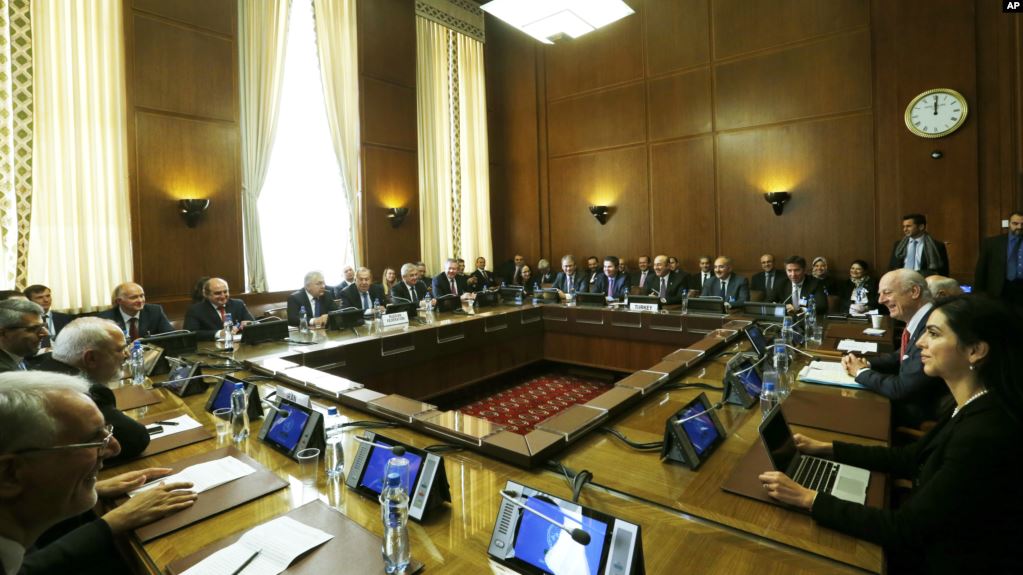
The Constitutional Committee
President Al-Assad further addressed the ongoing Syria peace process and the formation of the Constitutional Committee; here, President Al-Assad repeatedly highlighted Syria’s sovereignty. He stated that “the future of Syria is decided exclusively by the Syrians, and friends providing advice…the UN is welcome to play a role, when it does so based on its charter, which is based on state sovereignty.” He added that “the constitution is not subject to bargaining, and Syria will not allow ‘hostile states’ to achieve their objectives through their agents who hold Syrian nationality”; regarding the constitutional committee itself, he stated that “there is a side that represents the viewpoint of the Syrian government and the Syrian people…but the other side doesn’t represent Syrians…rather it represents the Government of Turkey.” To some extent, President Al-Assad is here openly rejecting the ongoing Syria peace process, at least the Geneva process; indeed, regarding the peace process as a whole, he stated that it “hasn’t achieved anything, because hostile countries are still insisting on their aggression” and these hostile countries continue to “obstruct of any special, serious processes such as Sochi and Astana.”
‘Foreign Actors’
The end of President Al-Assad’s speech, and the part which has attracted the most analysis, was his specific discussion of the role of Turkey and the U.S. in Syria; although indeed, the theme of hostile foreign involvement in Syria was a major component of nearly every topic of the speech. President Al-Assad outright rejected the legitimacy of Turkish proxies in northern and northwestern Syria Syria, as well as Turkish proposals of a ‘Safe Zone’, adding that “[Turkey] had been calling for [Safe Zones] since the first year of the war.” President Al-Assad also stated that “the problem lies with the Syrians who worked with the West, the US, and Turkey, and who gave justifications for Turkey to interfere, all the way back since the beginning”; these comments were certainly directed at both Turkish proxy groups in northern and northwestern Syria, as well as the Kurdish Self Administration. To these groups, he added that: “The question today is: where is freedom? It seems the freedom they had been talking about is only in the bosom of the Americans or the occupiers…it seems that democracy is giving foreigners free rein in their [Syrian] lands. To them we would say: why do you act like lions against your state, and act like a cats against the occupier?…the Americans will not protect you…you will be a bargaining chip in their pocket along with the dollars they have, and they have already started bargaining. If you don’t prepare yourselves to defend your country, you will be slaves for the Ottomans. Only your state will protect you, and only the Syrian Arab Army will defend you when you join it and fight under its flag.” Much of the existing analysis on these statements is broadly correct: President Al-Assad is clearly indicating to the Kurdish Self Administration that the terms of the ongoing negotiations with the Government of Syria will be based on full submission to the Government of Syria, and that any preservation of local governance will, at least from the Government of Syria’s perspective, be based on their interpretation of Decree 107.
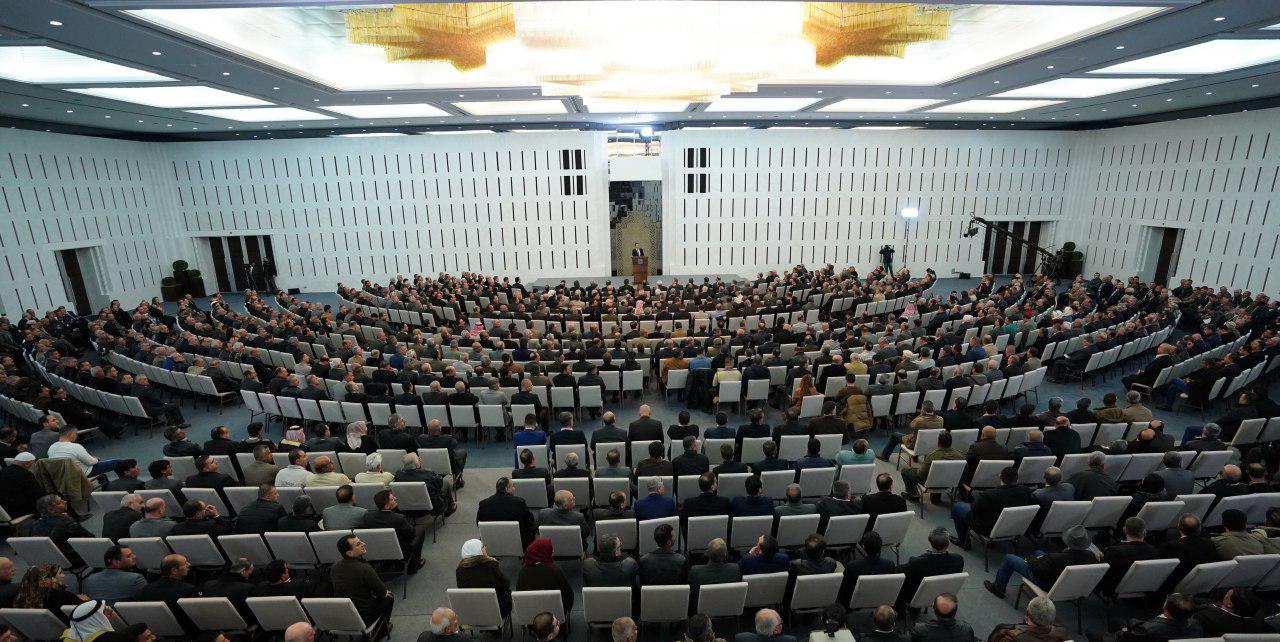
What Does it Mean?
In some ways, President Al-Assad’s speech is nothing new; he emphasized the Government of Syria’s sovereignty, he blamed the conflict on foreign actors, and he rejected attempts to change the structure of the Syrian government or the constitution. While lacking in charisma and new content, President Al-Assad’s speech is extremely important as an expression of Government of Syria de-facto policy. Indeed, the Syrian Prime Minister’s office has already convened a preliminary meeting to “develop the executive program” noted in the President’s speech. Thus, the themes addressed in the speech may come to define the upcoming period of the Syrian conflict and post-conflict. A more empowered and theoretically independent local administration, which still remains beholden to more centralized state apparatuses, will certainly become a major focus for international actors and UN agencies, funds, and programmes working in Syria. The Government of Syria will likely continue to call for and nominally ‘facilitate’ refugee returns, while simultaneously making return extremely challenging for untrusted individuals and populations. The concept of the ‘Four Wars’ as a justification for poor economic conditions will likely be repeatedly cited in the coming year; indeed, the Four Wars concept makes the Syrian conflict an endless conflict, and justifies not only continued military action, but also crackdowns on social media use and internal arrests of Government of Syria officials for corruption. The rejection of the Constitutional Committee, and the emphasis on the need for the Kurdish Self Administration (and Turkish groups in northern Syria) to submit to the Government of Syria, will naturally have a major impact on the Syrian peace process.
However, perhaps the most important point in the speech is indicated by a stylistic choice made by President Al-Assad; not once in the speech does President Al-Assad use the term ‘civil war’ (harb ahliya). He repeatedly cites the conflict as a ‘war against terrorists’ or against hostile foreign powers, but refuses to use terminology that would suggest that the war has pitted Syrians against Syrians, thus implying that those who fight against the Government of Syria are either traitors or have been duped by foreign powers. This is troubling; the Syrian conflict is most certainly a civil war, fought between different social, religious, economic, geographic, and political communities within Syria. To make it state policy to refuse to accept this basic reality is an indication that the Government of Syria has no intention of resolving the myriad of underlying causes and grievances that sparked the conflict; unfortunately, returning to the Syria of 2010 is impossible, and a new local governance system is insufficient to ensure Syria’s future stability.
Whole of Syria Review
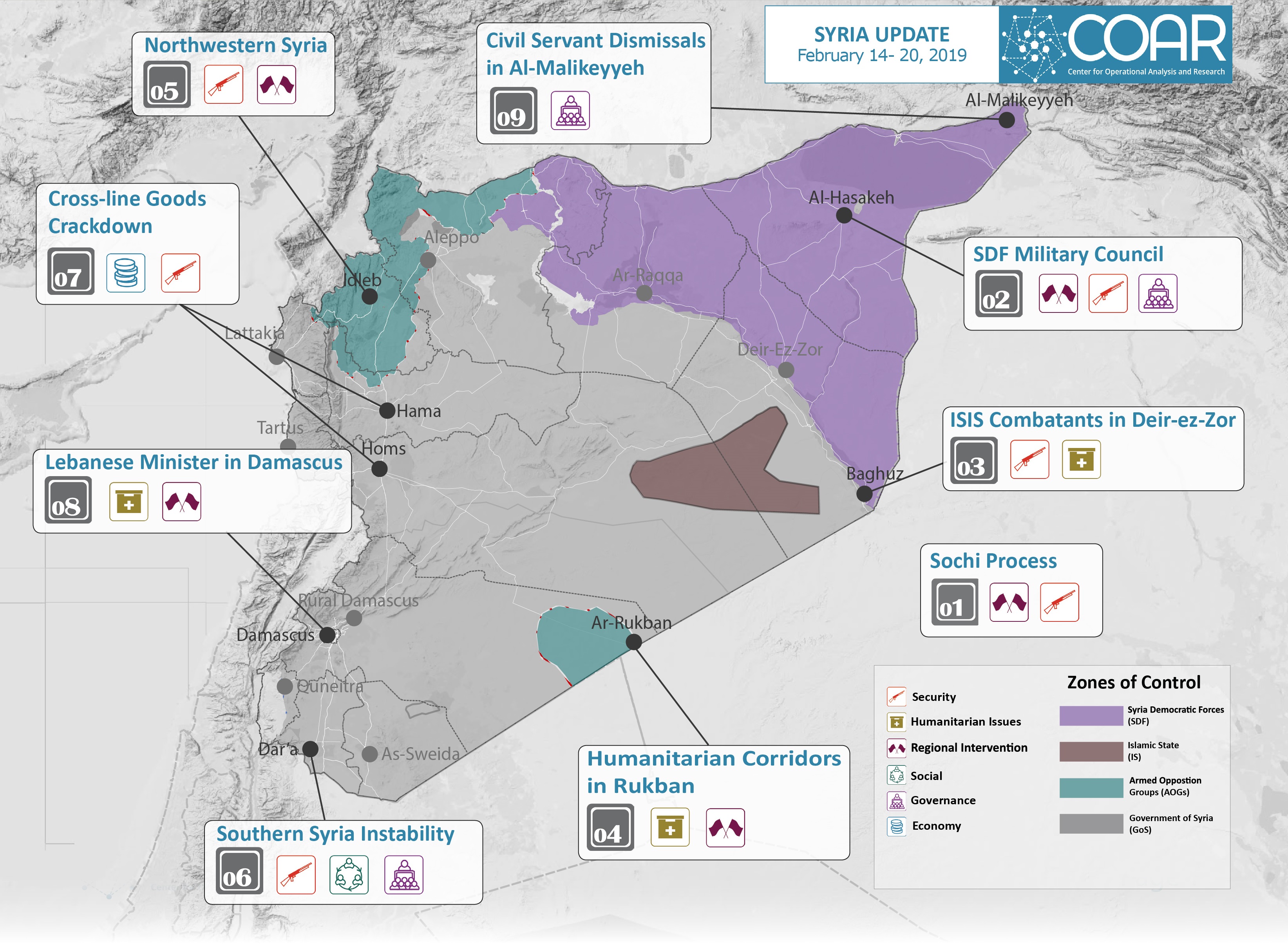
1. Sochi Process
Sochi, Russia: Between February 14 and 15, President Putin of Russia, President Erdogan of Turkey, and President Rouhani of Iran convened a meeting in Sochi, Russia, during which they discussed developments of Syria. The Sochi meeting reiterated the importance of Syria’s sovereignty, territorial integrity, and unity. The Government of Turkey emphasized the potential creation of a safe zone in northeastern Syria, although this proposal was not entirely endorsed by both the Governments of Russia and Iran; Russia, in particular, continued to emphasize the existing legal frameworks between Governments of Turkey and Syria, namely the 1998 Adana Agreement, which allows Turkey to launch anti-PKK operations in Syria so long as proper notification and coordination with the Government of Syria occurs. Indeed, following the meeting, on February 18 President Putin’s spokesman Dimitri Peskov indicated that Russia would be open to “[Turkish] cross-border operations by entering to a certain degree.” With regards to northwestern Syria, the convening parties agreed to take additional measures to end the presence of extremists groups in northwestern Syria; the specific details on these new steps were not disclosed. However, President Erdogan reportedly stated following the Sochi meeting that “joint operations [in Idleb] can be held at any time in line with the developments. There is no obstacle in front of these.” Additionally, regarding a potential offensive in northwestern Syria, Russian spokesman Peskov added that “we do need an operation, but we have to decide on whether it will be Turkey’s operation or some other countries.” To that end, it is highly noteworthy that several media sources have indicated that President Erdogan had reportedly requested access to airspace above Idleb during the Sochi talks.
Analysis: The Sochi and Astana processes are in some ways the most important diplomatic processes ongoing in the Syrian conflict, largely due to the fact that the Governments of Russia and Turkey have a large degree of leverage over the fates of both northwestern and northeastern Syria. Two specific points stand out from this round of the Sochi agreement: The first is that, through the repeated citation of the Adana agreement, the Government of Turkey has been effectively given a justification to directly intervene against the Kurdish Self Administration. This is not likely to happen in the near term – indeed, it is likely to be contingent upon both the U.S. withdrawal from Syria and the ongoing negotiations between the Kurdish Self Administration and the Government of Syria. Nevertheless, should the U.S. withdraw, and the Self Administration fail to reach an agreement with the Government of Syria, the diplomatic groundwork has been laid for further Turkish military interventions. The second is that the situation in northwestern Syria is now extremely precarious, although not as one might assume. President Putin, and Russian representatives, have repeatedly stated that a Russian-led Idleb offensive is not forthcoming in the immediate future, but have indicated that an offensive remains possible and that the onus is on the Government of Turkey to resolve the situation in northwestern Syria. The fact that President Erdogan reportedly requested airspace access is particularly concerning, and a possible indication that Turkey may be compelled to take more direct military action against Hay’at Tahrir Al-Sham in Idleb in order to prevent a Government of Syria-led northwestern Syria offensive.
2. SDF Military Council
Al-Hasakeh City, Al-Hasakeh Governorate, Syria: On February 17, the SDF Military Council convened a meeting to discuss its future strategy in light of the expected defeat of ISIS in southern rural Deir-ez-Zor governorate. The meeting covered a variety of topics; in a statement released after the meeting the SDF committed itself to two important points: the first was that the SDF rejected Turkish claims that it posed a threat to Turkish security, and that Turkey was the actual threat to Syrian security through its occupation of northern Syria; however, the statement added that the SDF was open to an “internationally monitored safe zone along the northern borders of Syria.” The second was that the SDF remains willing to hold negotiations with the Government of Syria, on the condition that the Government of Syria take into account the special status of the SDF, and make a constitutional recognition of the Kurdish Self Administration in northeastern Syria.
Analysis: The outcomes of SDF Military Council’s meeting are somewhat surprising for two reasons. It is certainly surprising that the SDF would acquiesce to any potential safe zone in northeastern Syria, as currently the most likely safe zone proposals often appear to effectively cede control to groups closely linked to the Government of Turkey (such as Iraqi Peshmerga); therefore, the request for an ‘internationally monitored’ safe zone is notable, but it is unclear which international actor could or would possibly assume such a responsibility. Furthermore, the SDF’s demands for autonomy are increasingly unlikely to come to fruition, especially considering President Assad’s recent statements directed at the Kurdish Self Administration (and covered in the in-depth analysis section above). Considering the fact that U.S. military forces will begin to withdraw from Syria in the near-term, the Kurdish Self Administration and the SDF are quickly running out of time to negotiate a favorable agreement, or indeed, any agreement at all.
3. ISIS Combatants in Deir-ez-Zor
Baghuz, Eastern Deir-Ez-Zor Governorate, Syria: Throughout the reporting period, limited fighting continues to take place between the SDF and ISIS in the vicinity of Baghuz, in eastern Deir-ez-Zor governorate. Media reports indicated that those ISIS combatants remaining in the area have asked for a safe passage to Iraq, but the SDF has rejected their request; as per the same source, the SDF has allowed the entry of humanitarian aid to a total of 300 combatants and civilians in the area, in return for ISIS freeing SDF prisoners. The fate of the international ISIS combatants continues to remain undecided. In a tweet on February 17, U.S. president Donald Trump asked that European countries repatriate more than 800 ISIS combatants of various European nationalities. For its part France expressed its willingness to repatriate 130 French ISIS combatants, whereas a German Ministry of Interior spokeswoman indicated that the return of German citizens is conditional on their access to a consular office. In turn, Denmark rejected Trump’s request, as per a statement made by a spokesperson for Danish Prime Minister Lars Løkke Rasmussen.
Analysis: Regarding the fate of the captured international ISIS combatants, it is likely that eventually most will be repatriated, and put on trial, in their countries of origin; indeed, this would likely be the most preferable outcome, as the alternative would be to turn over these captives to the SDF or the Government of Syria. Should this take place, it would be extremely difficult to track these individuals, especially considering the degree to which the Government of Syria has utilized jihadist prisoners for political purposes in the past.
4. Humanitarian Corridors in Rukban
Rukban Camp, Eastern Homs Governorate, Syria: On February 19, the chief of Russia’s National Defense Control Center, Mikhail Mizintsev, stated that two humanitarian corridors for Rukban residents were now open for the evacuation of civilians; Mizintsev indicated that the corridors were opened in coordination with the Government of Syria, but not the U.S. The two corridors were reportedly opened in Jlieb and Jabal Al-Ghorab, where Russian Police will oversee the process of evacuation and the resettlement of evacuees to their former areas of origin. A statement made by the head of Rukban local council, Derbas Al-Khalidi, indicated that many camp residents remain reluctant to evacuate through these corridors due to the fact that the Jleib crossing is only open to Government of Syria controlled areas; alternatively, Al-Khalidi requested the evacuation of civilians to opposition-controlled areas in northwestern Syria.
Analysis: Recent steps to establish ‘humanitarian corridors’ at the Rukban camp indicate that the Governments of Syria and Russia intend to fully resolve the status of the Rukban camp, without necessarily linking the status of the Rukban to broader developments pertaining to the U.S. military withdrawal from Al-Tanf. Indeed, the joint SARC-UN humanitarian convoy sent to the camp last week, and the “intention survey” conducted, also demonstrate the Government of Syria’s willingness to make the resolution, and reconciliation, of the Rukban camp a local Syrian issue, as opposed to an international one. Despite Al-Khalidi’s comments, it is possible that these humanitarian corridors could be used by some camp residents, especially those who had previously fled ISIS and now face increasingly dire humanitarian circumstances.
5. Northwestern Syria
Northwestern Syria, Syria: Throughout the reporting period, Government of Syria shelling in northwestern Syria drastically increased across numerous communities; indeed, the shelling between February 14 and February 19 targeted nearly every major community in northern Hama, southern Idleb, and eastern Idleb, and has been the most intense and widespread shelling since the start of the September 2018 Northwestern Syria Disarmament Zone Agreement. In response armed opposition groups retaliated by shelling As-Suqaylabiyah, Muhradah, northern rural Lattakia governorate, and Hama city; this marked the first significant armed opposition shelling of Hama city in at least two years. This increase in conflict intensity resulted in numerous deaths and injuries. The Union of Medical Care and Relief Organization, a medical organization in northwestern Syria, stated that the shelling on Khan Shaykun and Ma’arrat An Nu’man alone killed at least 18 civilians between February 16 and 18. Notably, on February 18, The Salvation Government issued a statement condemning the Government of Syria attacks, and urged armed opposition groups to retaliate collectively.
Analysis: As noted, the degree of Government of Syria shelling in northwestern Syria is unprecedented. Normally, a spike in the intensity and frequency of shelling to this degree would indicate that a major offensive is immediately forthcoming. However, in light of the outcomes of the Sochi conference, a major Government of Syria offensive is not necessarily likely in the near term; indeed, Russian representatives have repeatedly noted that a final agreement on northwestern Syria has not yet been decided. That said, the intensity of the conflict in northwestern Syria now poses a separate problem in that continued Government of Syria attacks in northwestern Syria may trigger increased retaliation from armed opposition groups, which could eventually lead to an unintended breakdown of the northwestern Syria Disarmament Zone Agreement, and thus a larger confrontation between the Government of Syria and the armed opposition.
6. Southern Syria Instability
Dar’a Governorate, Syria: Throughout the reporting period, several media sources continued to report on the increasingly regular targeting of Government of Syria military and security forces in Dar’a governorate. On February 14, a Military Security Branch commander was reportedly killed by small arms fire on the road linking Tafas and Da’el, western Dar’a; the attack has yet to be claimed by any group. Following that, on February 15, Government of Syria forces were reportedly targeted by small arms fire in As-Sanamayn, reportedly causing several deaths and injuries. Another Military Security Branch commander was shot and injured by unknown assailants on February 17; the Dar’a Popular Resistance subsequently claimed responsibility on a pro-opposition Facebook page. Additionally, reports of Government of Syria detentions and raids throughout southern Syria continued. Reportedly, a series of raids took place in Hara and Nawa, western Dar’a, on February 13; the raids reportedly targeted former armed opposition commanders and local activists that were formerly involved in local opposition administrative structures and councils.
Analysis: Reports of general instability in southern Syria, specifically in Dar’a governorate, have been ongoing since the reconciliation agreement implemented in July 2018. The turmoil and unrest in Dar’a, as noted in previous COAR Syria Updates, is likely a manifestation of two specific dynamics: the growing local discontent in Dar’a on account of a lack of services and military conscription, as well as the reported competition between different Government of Syria military and security forces in the area, all of which are now heavily comprised of reconciled former opposition combatants from southern Syria. An absence of services, increased insecurity, and growing mistrust between local tribal notables and the Government of Syria will likely continue to shape dynamics in southern Syria for the foreseeable future, or at least a new local agreement is reached and maintained.
7. Cross-line Goods Crackdown
Homs City, Homs Governorate, Syria: On February 19, media sources indicated that the Government of Syria Customs Forces closed at least eight commercial shops in Homs city, under the pretext of carrying Turkish goods that were identified as ‘illegitimate.’ As per the same source, the Customs Forces also imposed fines on the shop’s owners, and closed down several other shops for not having required military approvals and not paying taxes. Government of Syria Custom forces also reportedly took similar measures at several poultry stores in Hama city that were accused of purchasing their goods from opposition-controlled northwestern Syria.
Analysis: The ongoing raids targeting businessmen trading in Turkish goods were covered in a previous COAR Syria Update. These raids, led by the Customs Forces, are likely a means for the Government of Syria to regain its monopoly over cross-line trade with armed opposition-controlled areas. . The current cross-line trade between Government of Syria and armed opposition-controlled areas is reportedly largely controlled by numerous businessmen and importers, who have business interests in both armed opposition and Government of Syria-held areas. Therefore, the Government of Syria is not likely seeking to halt the flow of Turkish commodities; rather it seeks to solidify its control on the laissez-faire commercial dynamics in northwestern Syria. Indeed, a wholesale ban of Turkish goods would be nearly impossible, as they are reportedly ubiquitous even in Damascus city.
8. Lebanese Minister in Damascus
Damascus, Syria: On February 18, Lebanese and Syrian media sources stated that the newly appointed Lebanese Minister of Displaced Peoples Affairs, Saleh Gharib, visited Damascus city at the invitation of the Government of Syria. Of note, Saleh Gharib is a member of the Lebanese Democratic Party, a Lebanese-Druze political party, which is aligned with the Free Patriotic Movement, the leading pro-Government of Syria Lebanese political party in the new Lebanese government. The new government was officially formed on February 15, and included the reshuffling of numerous ministerial positions; however, despite the establishment of a new Lebanese government, there is still no clarity on the position of the Lebanese government on the Syrian refugee issue. Indeed, the inaugural ministerial statement of the newly established government explicitly refrained from stating Lebanon’s official stance on the process of Syrian refugee return, referring only to ‘the safe return of refugees’ as being a priority, and referencing both the Russian-led refugee return proposals as well as UN proposals (which place a greater emphasis on ‘voluntary’ returns) as possible initiatives.
Analysis: Despite the recent establishment of a new Lebanese government, the potential and manner of refugee return will likely remain a major point of contention amongst Lebanon’s political parties. That said, as the newly appointed Lebanese government mirrors that of the recently elected parliament, and consequently parties close to the Government of Syria (namely the Free Patriotic Movement, Amal Party, and Hezbollah) form a majority. However, even those parties which are nominally opposed to the Government of Syria, such as the Lebanese Forces, are also opposed to the continued presence of Syrian refugees in Lebanon. Therefore, while some parties, such as Prime Minister Saad Al-Hariri’s Future Movement, have emphasized the ‘safe and voluntary’ return of refugees as being a major priority, the largely consensus-based Lebanese political system appears to be heavily weighted towards a more ‘forceful’ approach toward Syrian refugees in Lebanon.
9. Civil Servant Dismissals in Al-Malikeyyeh
Al-Malikeyyeh City, Al-Hasakeh Governorate, Syria: On February 18, local sources indicated that the Government of Syria Health Ministry in northeastern Syria issued an administrative decision to dismiss several civil servants in Malkiyeh city, Al-Hasakeh governorate, under the pretext that these civil servants were working with the Kurdish Self Administration. The individuals dismissed included the joint director of Health Directorate of the Kurdish Self Administration, and two directors of of the National Hospital in Al-Malikeyyeh city.
Analysis: Government of Syria and Kurdish Self Administration governance structures often exist in parallel throughout northeastern Syria, and indeed, regularly coordinate, despite the fact that nominally both administrative structures have regarded each other’s processes and regulations as illegitimate. Given the major threats facing the Kurdish Self Administration with respect to the imminent withdrawal of U.S. forces and the potential Turkish intervention, it is increasingly clear that Kurdish Self Administration governance structures will be compelled to subordinate to the Government of Syria. Thus, this incident should be viewed as the Government of Syria signalling that Kurdish administrative structures are increasingly illegitimate, and will undermine the Kurdish Self Administration’s legitimacy and capacity.
The Wartime and Post-Conflict Syria project (WPCS) is funded by the European Union and implemented through a partnership between the European University Institute (Middle East Directions Programme) and the Center for Operational Analysis and Research (COAR). WPCS will provide operational and strategic analysis to policymakers and programmers concerning prospects, challenges, trends, and policy options with respect to a conflict and post-conflict Syria. WPCS also aims to stimulate new approaches and policy responses to the Syrian conflict through a regular dialogue between researchers, policymakers and donors, and implementers, as well as to build a new network of Syrian researchers that will contribute to research informing international policy and practice related to their country.
The content compiled and presented by COAR is by no means exhaustive and does not reflect COAR’s formal position, political or otherwise, on the aforementioned topics. The information, assessments, and analysis provided by COAR are only to inform humanitarian and development programs and policy. While this publication was produced with the financial support of the European Union, its contents are the sole responsibility of COAR Global LTD, and do not necessarily reflect the views of the European Union.



